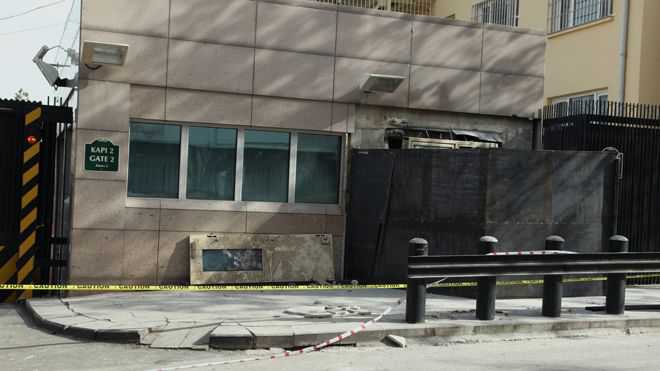ANKARA, Turkey – Turkish authorities suspected the outlawed leftist group that bombed the U.S. Embassy in Ankara was planning an attack, but did not have enough information to prevent it from happening, Turkey’s president said Monday.

The suicide bomber struck the U.S. Embassy on Friday, killing himself and a Turkish security guard and seriously wounding a former Turkish television journalist.
Turkish authorities said the bomber, Ecevit Sanli, was linked to the outlawed Revolutionary People’s Liberation Party-Front, or DHKP-C, and the leftist group said it launched the attack to oppose U.S. foreign policy in the Middle East.
President Abdullah Gul said Turkish police and intelligence officials were on high alert about the DHKP-C, knowing it was planning an attack of some sort but didn’t know where or when.
“Our security and intelligence organizations knew the terror organization was seeking to carry out an attack; they were on alert and had warned everyone,” Gul said at a news conference. “But unfortunately it could not be prevented, and they carried out this attack against the U.S. Embassy.”
The U.S. Embassy resumed business on Monday, and a minute of silence was held for the 46-year-old Turkish guard who died in the attack.
Turkey’s state-run Anadolu news Agency said police have questioned 12 people in connection with the attack, including one who reportedly asked directions to Paris Street, where the side entrance to the embassy — the site of the attack — is located.
Quoting unidentified sources, Anadolu said Sanli posed as a courier, asked to be let in by showing an envelope, then detonated his explosives as soon as the gate to a security check point was opened.
Officials have said the bomber spent several years in prison on terrorism charges before being released on probation in 2001 after being diagnosed with a hunger-strike related disorder. They said he fled Turkey after his release.
During a visit to the Czech Republic on Monday, Turkish Prime Minister Recep Tayyip Erdogan said Sanli had been living in Germany and entered Turkey illegally to carry out the attack. Erdogan said it shows how important it is for Europe’s allies to work together in the battle against terrorism, and he complained that several European countries, including Germany and France, were not responding to Turkish requests for the extradition of militants wanted by Turkey.
“We are not getting the support we need,” Erdogan said. “Even those who have carried out the bloodiest of attacks are walking freely. Even though we present them with evidence, they are not being caught.”
“We can no longer tolerate this lack of interest,” Erdogan said.
For example, he accused France and Germany of ignoring Turkey’s requests to extradite Sakine Cansiz, who had helped found the Kurdistan Workers Party, a rebel group seeking autonomy for Turkey’s Kurds. She was one of three Kurdish activists who were gunned down in Paris last month.
DHKP-C has claimed responsibility for assassinations and bombings since the 1970s, but it has been relatively quiet in recent years. Compared to al-Qaida, it has not been seen as a strong terrorist threat.
In a statement posted on a website linked to the group, the DHKP-C said the United States was “responsible for every drop of blood shed all over the world” from “Iraq to Afghanistan, from Libya to Syria.”
It accused Erdogan’s government — which has become the Syrian regime’s strongest critic — of being a “lackey of the imperialists” by trying to topple the regime of Syrian President Bashar Assad.
Friday’s attack on the U.S. Embassy occurred as NATO deployed six Patriot anti-missile systems to protect its ally Turkey from a possible spillover from Syria’s civil war. The U.S., Netherlands and Germany are each providing two Patriot batteries.
The suicide attack was the second deadly assault on a U.S. diplomatic post in five months.
On Sept. 11, 2012, terrorists attacked a U.S. mission in Benghazi, Libya, killing U.S. Ambassador Chris Stevens and three other Americans. The attackers in Libya were suspected to have ties to Islamist extremists, and one is in custody in Egypt.
U.S. diplomatic facilities in Turkey have been targeted previously by terrorists. In 2008, an attack blamed on al-Qaida-affiliated militants outside the U.S. Consulate.
via Turkey says it knew group that bombed US embassy was planning an attack | Fox News.

Leave a Reply